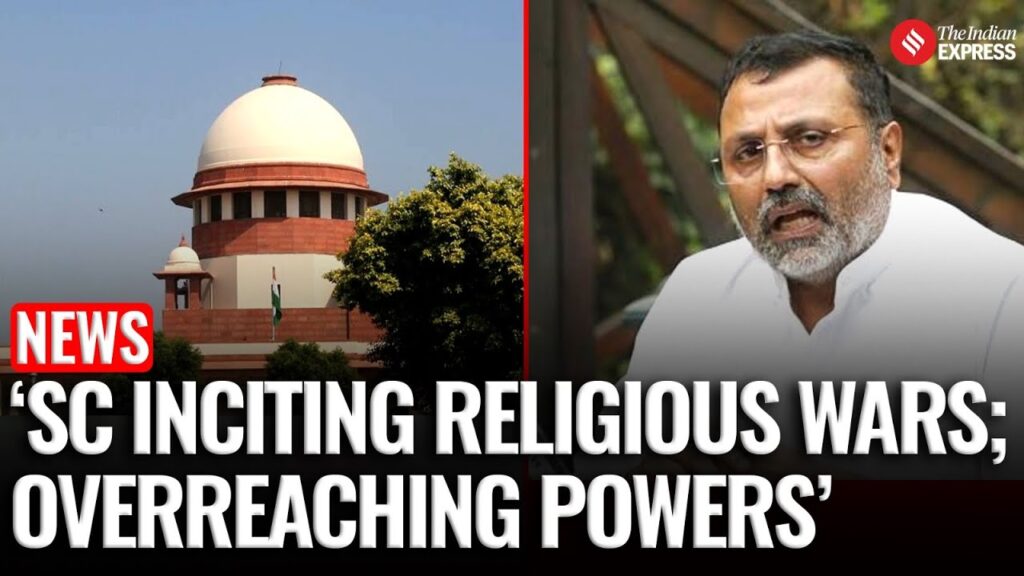Mahua Moitra is absolutely correct in saying: “Remember – a Pitbull does nothing without its master’s command.” Under the regimented operation of Prime Minister Narendra Modi and Home Minister Amit Shah, no leader, irrespective of his stature, can dare to make any observation, on sensitive issues, without their tacit support and approval.
BJP MP Nishikant Dubey on Saturday slamming the Supreme Court and accusing it of “judicial overreach” and asserting that if it wants to make laws, then there is no need for Parliament in the country, meant to demean and smear the image of the apex court. It is quite significant to watch that Dubey’s insinuation came out just a day after apex court while hearing on Waqf Act had raised questions over some of the Act’s provisions, including the ‘Waqf by user’ provision.
The government had then assured the top court that it would not implement some parts of the Waqf (Amendment) Act until the next hearing on May 5. It was first ever challenge to Narendra Modi’s authority. In the past no CJI of Supreme Court had questioned the authority of Modi. Though Modi did not publicly deride the order of the apex court, he through his public speeches across the country, reiterated that his action on Waqf Bill was politically correct. Obviously there is no ambiguity in inferring that the BJP leadership had planned an offensive against apex court and Dubey’s innuendo was part of the design. It also intended to convey the message that India’s present ruling party , will dictate the judicial institution.
Before him the Vice President Jagdeep Dhankar has also targeted Supreme Court It is a publicly known fact that he does not bother for the dignity of the office he holds, he can put it at stake when it comes to defend and protect the interest of Modi. He blatantly criticised highest court for its stand on Waqf Bill. He forgot that he holds a constitutional position and must refrain from speaking ill for another Constitutional institution. Speaking to interns of the Rajya Sabha, Dhankhar described the judges as “super parliament”. Dhankar himself is a lawyer, Obviously he must be aware that judiciary is well within its right to examine any Act passed by the Parliament.
He was also critical of the apex court’s invocation of Article 142, which he described as a “nuclear missile against democratic forces”. Constitutional immunity does not allow Dhankar to make patently offensive remarks. His remarks makes it absolutely clear that he was prompted by some ill-intentioned motive. Though he has been elected on a BJP ticket, he ought to not forget that he is holding two offices which enforce upon him the constitutional responsibility of maintaining neutrality.
This latest incident simply reinforces the belief that the country is not being run by politically efficient and astute political leadership. Had it not been the case, Modi must have refrained from speaking on the Waqf Bill. His silence would have been enough. His remarks at various rallies simply strengthens the common belief that he was trying to bully the Supreme Court and refrain it from coming out with comprehensive order on May 5, when the court will hear government’s view.
Modi is known to disfavour the judiciary. His response to the needs of judiciary has seldom been ideal. During his eleven year rule, Modi has been resorting to principle of majoritarian rule, in other words the political hegemony of Hindu majority. Though saffron ecosystem and Modi are aware of the fact that they cannot evict Muslims, they continue to practice the hegemony of majority Hindu to consolidate their position amongst the Hindus.
Since Modi’s earlier actions like Love jihad, vigilantism, lynching, public beatings, riots, the NRC, the CAA, the Ram mandir, abrogating the state status of Jammu and Kashmir did not evoke an intense anti-government stance from the judiciary, the saffron ecosystem and especially Modi was quite hopeful that this time too it would approve the government action. But it did not happen.
Significantly a Supreme Court lawyer, Anas Tanveer, representing one of the litigants against the waqf act in the apex court has sent a letter to Attorney-General R. Venkatramani seeking his consent to initiate contempt proceedings against Dubey. “I am writing this letter under Section 15(1)(b) of the Contempt of Courts Act, 1971, read with Rule 3(c) of the Rules to Regulate Proceedings for Contempt of the Supreme Court, 1975, to humbly seek your kind consent for initiating criminal contempt proceedings against Shri Nishikant Dubey… for statements made by him in public that are grossly scandalous, misleading, and aimed at lowering the dignity and authority of the Hon’ble Supreme Court of India.”
It is imperative that AG must act to preserve the dignity of the highest court. Dubey treats himself above the law of the land. This audacity ought to be curbed. Just after hurling invectives against Supreme Court, Dubey threw a nasty communal slur at former Chief Election Commissioner S Y Quraishi, “he was not an election commissioner but a “Muslim commissioner”. How could he dare to malign the images of a person? He had earlier accused the Supreme Court of “inciting religious wars in the country”, and now virtually abusing CEC of being Muslim Commissioner.
Though the BJP president J P Nadda had disowned Dubey’s statement on SC, it was indeed not more than an eye wash. . Nadda’s warning was merely for public consumption. Had it really carried some weight, Dubey must not have dared to abuse Quraishi only a day later.
Lawyers and academics strongly hold that Supreme Court must act decisively and show the people, out to denigrate the judiciary, their right places. Tolerating the nonsensical behaviour and utterances of such people will prove to be morale booster for others to indulge in the act of insinuation. (IPA Service)



 Bihar To See Significant Political Churnings Before Assembly Polls By Year End
Bihar To See Significant Political Churnings Before Assembly Polls By Year End 